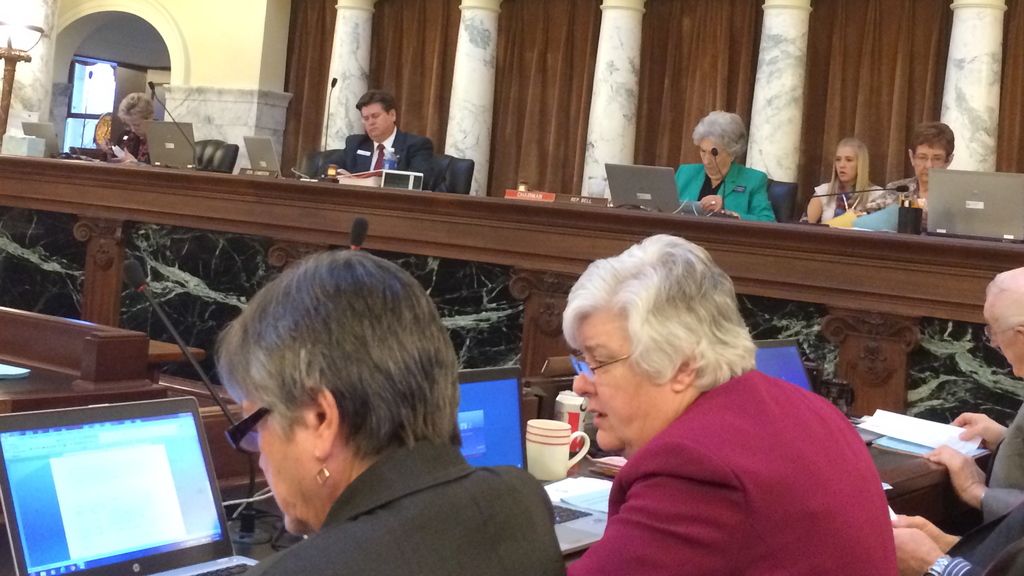(UPDATED, 4 p.m., Wednesday, with additional reaction to the budget).
State budget writers Monday approved a $66 million increase in public school funding.
The Joint Finance-Appropriations Committee set the nearly $1.7 billion budget, a 5.1 percent increase in state general fund spending.

The budget would increase teacher salaries by 1 percent, provides money for teacher leadership “premiums” and reverses $35 million in cuts that school districts absorbed during the Great Recession.
“This is the best public school budget we will have set since 2008,” said Sen. Dean Cameron, R-Rupert, JFAC’s co-chairman. “This is a really good budget. It’s not perfect, certainly, but it’s as good a public school budget as we’ve seen in a long time.”
The budget was broken down into seven components, with the biggest debates surrounding salaries and technology.
The Republican supermajority led the push for 1 percent raises for teachers and administrators.
Reps. Shirley Ringo, D-Moscow, and Phylis King, D-Boise, pushed for 1.5 percent raises.
“Every budget that we pass reflects on our values. As we all know, since the downturn in the economy, we’ve made significant changes to the state salary schedule that goes out to districts to pay teachers,” Ringo said. “The point is all teachers have felt the bite of those changes, every single one of them.”

Ringo and King’s proposal for an additional increase in teacher pay won over only Sens. Dan Schmidt, D-Moscow, and Dan Johnson, R-Lewiston, and failed on a vote of 4-16.
Budget highlights include:
- $35 million to help restore operations funding, a 12 percent increase over this year.
- Increasing the operations funding per classroom unit from $20,000 to $22,401.
- $13.9 million in ongoing new funding for teacher pay. That includes a 1 percent increase in base salaries for teachers and raising the minimum teacher salary from $31,000 to $31,750.
- An additional $15.8 million in ongoing funding for teacher leadership awards.
- $8 million for classroom technology.
- $12.15 million for teachers’ professional development, which includes training for gifted and talented student programs.
- $5 million in one-time funding for content and curriculum materials.
- $2.25 million in one-time funding for Wi-Fi installation. But the committee members did not decide how to spend this $2.25 million; the vote on legislative “intent language” was put on hold for three days.
- $4.5 million to continue a statewide instructional management system. But budget-writers did not decide how to proceed — and how to act on the contract for the troubled Schoolnet system, which expires in June. Discussion of this “intent language” is also on hold for three days.
The proposed spending increase roughly aligns with the 5.1 percent increase Superintendent of Public Instruction Tom Luna sought, although some of the specifics differ.
After the hearing, Luna said the budget represents the culmination of “everything we have been working for, for the past seven, eight years.” He pointed out the funding plan still falls short of the high-water mark in Fiscal Year 2009, but got the state back above what it spent in 2008.
This represents “another important step forward in improving our schools and focusing on the changes that need to be made in our schools,” Luna told reporters.
House Education Committee Chairman Reed DeMordaunt, R-Eagle, also voiced early support for the budget, though he said he is still reviewing the complexities of the plan. He backed funding for advanced opportunities for high school students as well as the 1 percent increase in the base of teacher salaries, calling that move “an important piece.”
Gov. Butch Otter was seeking a 2.9 percent spending increase, and did not recommend raises for teachers, increasing the minimum teacher salary or paying for the teacher leadership awards.
The public school budget is the largest expense to the state, and represents roughly 47 percent of state spending, depending on how other agency budgets shape up.
State funding for the public school budget comes predominantly from sales tax, corporate income tax and personal income tax.
In order for the budget to be adopted, it still must clear the House and Senate and go to Gov. Butch Otter for final consideration. If any of the seven budgets fail, that spending plan would need to be rewritten and the process for that budget would start over with JFAC.
Check back with Idaho Education News this week for updates on the budget.
Disclosure: Schoolnet was funded in part through a startup grant from the J.A. and Kathryn Albertson Foundation, which also funds Idaho Education News.
